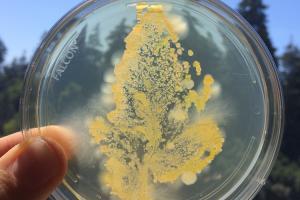
A new study by University of California, Berkeley, microbial ecologists used experimental evolution to help identify the core microbiome of commercial tomatoes. They selected for those microbial taxa that best survived on the plants and then showed that these “domesticated” microbial communities are able to effectively fend off random microbes that land on the plants. In other words, these selected communities look like a stable, healthy plant microbiome, akin to what a robust tomato plant might pass to its offspring.
“I see the implications of this work not just being about probiotics, but also about guiding agricultural practice,” said study leader Britt Koskella, a UC Berkeley assistant professor of integrative biology. “When planting fields, we should be thinking about how what we do — whether it is age structuring of crops or monocropping versus crop rotations, what is in the soil or what is living nearby — can impact the acquisition and health of the plant microbiome. We should be manipulating the growing conditions in a way that microbial transmission is more akin to what would happen naturally.”